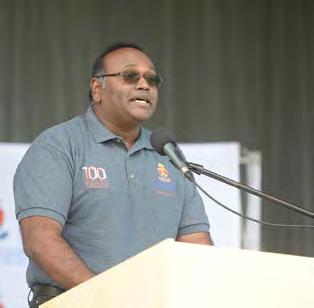
2 minute read
Career Mentorship Ensures that Graduates Are Ready for Work
The value of a degree from the University of Pretoria was demonstrated in 2019 when a survey revealed that 93% of its alumni were employed within six months of graduation. It is necessary to train students not only to find employment after they graduate, but also to excel at those careers and become leaders in their industries.
Career mentorship was identified as an important element of developing work-ready graduates. In light of this, the University launched a Career Mentorship pilot programme in 2019 as part of its Ready for Work initiative. This programme aimed to involve alumni in the mentoring of final-year students in the School of Engineering. Its goal was to develop workrelated skills and confidence relevant to the engineering profession and to build effective career networks.
The students in the School of Engineering who were selected to participate in the Career Mentorship pilot programme, conducted from April to July 2019, had to indicate why they would like to be part of the programme. The names of potential mentors were provided by the University’s Alumni Office, as well as the engineering consultancy, Aurecon. Eventually, 33 students and 24 mentors participated in the programme. The mentors, who varied from early-career engineers to senior professionals, had the option of choosing the mentees they thought they would be able to mentor.
The mentorship process included two meetings, either online or face-to-face, and one jobshadowing session. The mentors and mentees could decide on the topics they wished to discuss. The following themes were typically addressed: • How to cope with the new work environment • The process of becoming a registered engineer • The work experience of the mentor • How to develop management skills • How to apply for a job As both mentors and mentees had demanding schedules, which often made it logistically challenging to meet, they communicated via email or telephone calls. The main reflection of the mentors on the programmes was that they enjoyed watching someone grow personally. It gave them satisfaction and the opportunity to give back to the University.
Following the success of the pilot programme, it was extended to the remainder of the Faculty of Engineering, Built Environment and Information Technology, as well as the Faculty of Theology, in 2020. There were 90 students and 78 mentors involved in the programme.
In a survey upon completion of the programme, the mentees reflected positively on the programme and felt that the mentors had made a difference in their lives. The students indicated that they especially enjoyed the job-shadowing day.
‘It is by standing on the shoulders of giants that we are able to see further. It is critical to the development of the key skills required for our country’s development. The only way to empower people is by empowering them to empower themselves, and that can be done by learning from those that have gone before us.’ Paul Ssali ‘I could easily see that my mentor was an expert in her field and knew what she was talking about. The one thing that she told me that stood out was that you, as a person, are solely responsible for your happiness in the workplace (that is under normal circumstances, excluding situations such as terrible bosses or ridiculous working environments). If you are unhappy, you have the power to change that.’ Altus Bisschoff
Career mentorship: Altus Bisschoff











